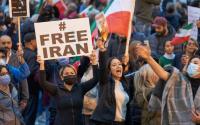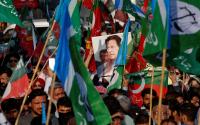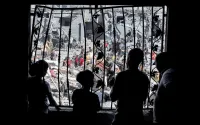Security can be regained if we take account of the fears of others The Guardian, Friday October 19, 2001Again and again on the way south from Kabul to Ghazni we heard a sound like that which might come from an orchestra of buzz saws. The big Soviet helicopters used the highway as a guide then turned with lumbering grace into the valleys and hills to east and west. As the noise of their rotors faded, it was replaced by the rending sound of rapid-fire guns and grenade launchers. That was more than 20 years ago, when real war in Afghanistan was just beginning. It is a dismal thought that the same brutal technology, in the shape of similar American gunships, is once again being directed at rifle-carrying young Afghans who were only just born when the Russians came to their country.
Ten years later at a dinner table in Amman, a discussion of the iniquities of Saddam Hussein's regime was under way. The air war against Iraq had just begun. Suddenly our hostess launched into an angry and tearful condemnation of the bombing. It seemed surreal. She and her husband, educated Christians, had just agreed with their guests that Saddam had to be kicked out of Kuwait and if possible deposed, yet now she was attacking what had to be done if such ends were to be achieved. As she spoke she glanced repeatedly toward the hallway where, it dawned on us, was the door to their children's bedroom. She feared for them, for what might happen if the war spread to Jordan, and with a mother's fury she hated all those who had set in train the processes that threatened her children.
It was not only the physical danger but the menace to the fragile political and social structures in which her children would have to grow up. Would the shops still be open in a week's or a month's time and would there be anything on the shelves? Would there still be a monarchy after the war? Would Amman's buildings still stand, stone upon stone? Would there even still be a place called Jordan? And we, visiting westerners, could afford to be cool, for our children were safe at home in London, Paris, or Washington. She was, in other words, railing against events and their many authors. Saddam, yes, but not only him.
War, especially bombing, that murderous interference from above, naturally breeds such anguish. Short-circuiting normal reasoning, it leads to cries and demands that may seem contradictory but have an emotional logic which is both understandable and dangerous. The danger is above all that of magnifying a threat to one's own existence while remaining incurious and unmoved about threats to others. Now we are all the actual or potential victims of bombing in a way that was not true 10 years ago, we are all subject to the erosion of reason which fear brings. The key to the restoration of balance lies in understanding that Bin Laden, over estimated though he is, has certainly managed to bring anxiety to the fore in all societies, in particular to the Christian, Muslim, and Jewish worlds. This is not just a matter of the fear of terrorist attacks but of deeper concerns about the purposes and achievements of these societies and their ideas of the future.
People in the west are dismayed by what they see as the ambiguous reaction of many Muslims to the attack on America, a reaction becoming more pronounced as military operations in Afghanistan go forward. It is certainly hard to defend some evident evasions of responsibility, blatant denials of fact, or examples of hypocrisy in the relations between elites and the peoples they rule. But part of the problem surely arises from that sense of vulnerability expressed a decade ago in Amman.
Whatever the cause, Muslims face again another cycle of intervention and manipulation. Western countries emphasise the cause of that cycle, Muslim countries the impact on them. Similarly, western countries emphasise that Afghans and Iraqis want liberation from their rulers, while Muslims have been disappointed in western-led liberations before.
Apart from the impact on individuals and their families, there are obvious dangers for societies whose governments enjoy limited legitimacy. There are less obvious dangers for those that have already embarked on the Islamist path or which may be headed for some kind of Islamist future. The lesson of Iran, for instance, has been that modern issues are submerged by Islamist change only to re-emerge in different form at a later stage. The lesson of Egypt, according to Geneive Abdo in her new book on that country, is that a "moderate" Islamism has prevailed over violent, militant Islamism, because it was a "counterpoint to the militants, a viable alternative both to the radicalism that was giving Islam a bad name and the authoritarian state".
Neither the "soft" Islamisation of Egypt nor the quasi-liberalised Iranian regime may be congenial to the west, but far less welcome, for Egyptians and Iranians as well as for us, would be any reversion to the militant path. The sense of new risk which Muslims feel is thus not without foundation.
Long before the attacks and well before the second intifada, David Selbourne had suggested in a prescient book that "the Jew's sense of insecurity - barometer of a wider social crisis - is growing. It is the unpredictable outcome of the disillusion and confusion of others which gives the greatest (and most ancient) cause for troubled speculation". What has happened since has reinforced Israeli and Jewish insecurity. Israeli governments sabotaged their own best chances for peace.
Worse followed in the shape of an increasingly ruthless war between Israelis and Palestinians. The murder of Rehavam Zeevi this week was another example of the discarding of limits by both sides. Sharon, in his "Czechoslovakia" speech had earlier given voice to widespread fears that the United States might now be ready to sacrifice Israel's interests. The point has been reached where the survival of the Israeli state, not seriously an issue for a generation, is seriously raised by an Israeli leader.
The citizens of western countries share a sense of apprehension with those of Muslim countries and of Israel. It is not only that we too can now be bombed. The projects of improvement, progress, and prosperity which give coherence to life in Europe and America have been undermined. At least for the moment the meaning of discussions on, for instance, European enlargement, constitutional reform, international trade, or ecological precautions has been diminished.
The picture then is of a widening net of fearfulness in which Europe, America, and the different regions of the Middle East and south Asia are equally enmeshed. Under such circumstances people tend to concentrate on their own fears and demand that others, as President Bush said, choose to be "either with us or against us". But it is only by taking into account the fearfulness of others, and the reasons why it takes such different forms from our own, that security can be regained.
· No God But God, Geneive Abdo, Oxford. The Spirit of The Age, David Selbourne, Sinclair-Stevenson.






